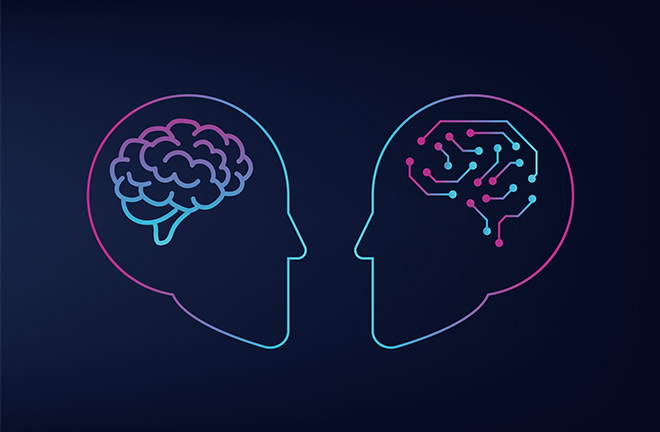Adaptive representation and the generation of intelligence

A human brain and an AI brain Photo: Nuth/TUCHONG
How intelligence is generated has long been a difficult question in the fields of philosophy, cognitive science and artificial intelligence. Humans possess consciousness and intelligence, and are capable of adjusting their behavior promptly in response to changes in their environment or goals. Endowing artificial intelligence with human-like adaptability, flexibility, and capacity for behavioral adjustment could be the key to its future development.
To this end, breakthroughs in conceptual frameworks are needed. One promising avenue is in the exploration of adaptive representation, which involves the subject’s ability to categorize target objects through intermediary objects. This capacity can be continuously enhanced as the environment or goals change.
Internal mechanism
Adaptability is a common feature of living organisms, and it extends to human cognitive functions. Cultural anthropology suggests that human intelligence and knowledge are jointly shaped by natural evolution and cultural development, entailing adaptability and manifesting representational attributes. Contemporary cognitive science also reveals that cognitive activity is a form of adaptive representational behavior.
The adaptability of artificial intelligence designed and created by humans is usually embedded in human adaptability. When an intelligent agent is capable of adapting to an ever-changing external environment, completing a variety of tasks, and solving various problems through self-learning, it demonstrates a certain level of adaptive representational ability that may generate intelligent behavior on the part of artificial systems.
Explanatory framework
Adaptive representation consists of two sub-concepts: adaptability, which means automatic regulation and self-replication, and representation, which means autonomous expression and the presentation of meaning.
Different sources of adaptability share the goal of adapting to environmental changes. Living organisms mostly adapt to the natural environment (including cultural and social environments), while intelligent agents adapt to the artificial environment and the natural environment (for instance, self-driving cars can use sensors to detect various situations in the natural environment and adjust their course accordingly).
As an explanatory framework, adaptive representation needs to be enabled by subjects. The subjects of artificial intelligence can be classified into five groups: logical subject, search subject, decision-making subject, learning subject, and problem-solving subject. Each group implies one type of ability: logical reasoning, discovery, planning, comprehension, and creativity required to complete complex tasks. These abilities constitute the capability system of adaptive representation in artificial intelligence.
Paths to adaptive representation in AI
First, enhance subjectivity. To some extent, the subject of artificial intelligence is either an intelligent agent or an intelligent group (algorithms or programs) that can be called an artificial subject. In the sense of “being intelligent,” an artificial subject is similar to a natural subject. Despite the differences in their enabling mechanisms, both types of intelligence have the same functionality in terms of problem solving.
Second, reinforce situationality. Adaptive representation involves synchronized changes in specific situations. In other words, both the representation and its corresponding object change dynamically in response to environmental changes. Adaptive representation is situation-based cognitive reasoning that can connect different cognitive systems to allow for the transition from biological adaptability to machine adaptability, thereby enabling machines to engage in autonomous learning, self-improvement, and self-representation.
Third, shape contextuality. The autonomous integration of intelligent agents into changing contexts, akin to human behavior, may hold the key to their ability to understand meaning. Context is indispensable when artificial intelligence seeks to emulate the operational mechanisms and models of human intelligence. Building a common-sense knowledge base for artificial intelligence and providing it with its own context through adaptive representation could be an important way to steer artificial intelligence towards human-level intelligence and beyond.
Fourth, exploit multiple realizability. In terms of artificial cognition, adaptive representation is typically embodied in the adaptive behavior of intelligent agents, and this adaptive representational capability can be realized through multiple representational means, including semantic networks, Bayesian networks, genetic algorithms, reinforcement learning, deep learning, and a combination of different approaches.
Wei Yidong is a professor in the School of Philosophy and Sociology at Shanxi University.
Edited by WANG YOURAN
